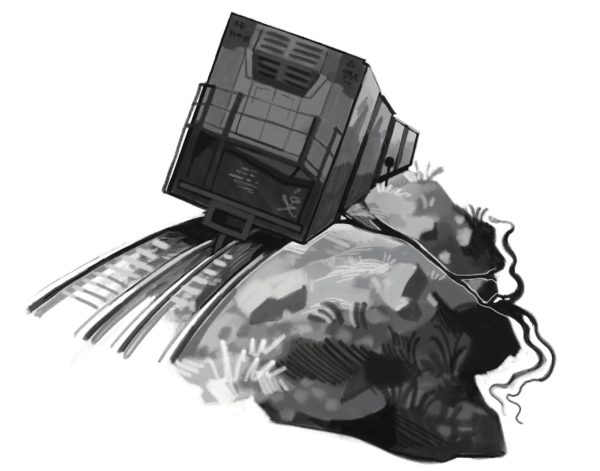
On Nov. 6 a train derailment south of Wallula caused a diesel spill of about 2,600 gallons into the Columbia River. The spill was quickly contained by Washington’s Department of Ecology and the cleanup is nearing completion as of Nov. 13.
Train derailments have made national news in recent years, especially in the aftermath of the derailment in East Palestine, Ohio, which caused a massive fire and spread toxins in the air throughout the area. Yet, despite extensive coverage, little has been done to turn calls for action into substantial change. Notably, a bipartisan bill to limit train derailments failed to pass in Congress.
Much like the situation in East Palestine, Ohio, the most recent train derailment in Wallula poses a serious environmental threat. Henry Roller ‘25, President of Salmon Conservation Club, noted in an email the local impact on the environment.
“It is very concerning anytime diesel or other fuels get spilled into a waterway, especially a river as important to the Pacific Northwest like the Columbia River. It sounds like the spill was contained relatively quickly, but [2,600] gallons of diesel spilled into the river isn’t good for salmon and other wildlife,” Roller said.
Roller wasn’t the only concerned community member. Ashley Hagen ‘28, a member of the Climate Justice Coalition, expressed her concerns as well.
“This affects the broader community because a lot of the diesel went into the Columbia [River], which as many know is a source of water, food – like fish – and recreational activity. There could be potential health problems from the spillage,” Hagen said.
According to cleanup contractors, spillage was contained quickly and nothing has been seen outside of the containment area, which was created by two lines of booms set out by the train company. However, complete harm can never be avoided after accidents like this and the most notable impacts are on wildlife. Nonetheless, The National Oceanic and Atmospheric Administration would characterize this as a small spill with limited impacts.
In a statement from the Confederated Tribes of the Umatilla Indian Reservation (CTUIR), concerns were also expressed, specifically due to the historical and cultural connection to the area.
“The Confederated Tribes of the Umatilla Indian Reservation is saddened to hear that approximately [2,600] gallons of diesel have spilled into the Columbia River near Wallula, Washington, following a Union Pacific train derailment on Nov. 6. Although we are glad no injuries to the train’s crew have been reported, we are disheartened that more than a thousand gallons of diesel have made its way into the river,” the CTUIR said.
The CTUIR emphasized the importance of greater care for the local rivers, and the need for efforts to reduce future spills.
“The three tribes that comprise the CTUIR – Cayuse, Umatilla and Walla Walla – have lived in the Columbia River Region since time immemorial and greatly value what the river provides such as salmon, other native fish and water itself. We urge the Washington State Department of Ecology to ensure that Union Pacific cleans as much of the spill as possible and to take greater care in the future to avoid such incidents,” the CTUIR said.
The Washington State Department of Ecology’s website says that they do both preventative and reactive work regarding spills. According to their website, Washington State has one of the lowest spill rates in the nation due to their emphasis on prevention. However, once a spill has happened, the harm has already been done.
Jasmin Adams, Spills Program Communications Director for the Washington State Department of Ecology, discussed further steps that have been taken to respond to this spill.
“Spills has begun the coordination process with Ecology’s Toxics Cleanup Program (TCP) to transition toward remedial cleanup to address residual oil which could not be recovered during the emergency response,” Adams said.
This, in addition to the emergency cleanup via absorbent booms, is the sufficient response to a bad situation, but it’s imperfect. Students pointed to policy and transitions to clean energy as necessary if we are to completely avoid this issue.
Additionally, students, including Hagen, pointed out the importance of students engaging with these topics and staying up to date on local news.
“I want to start reading up on more of the current events around Walla Walla because even though we are only here for four years, we will leave an impact, whether that is positive or negative, on the communities here. I hope this encourages other students to do the same,” Hagen said.
At a college that has so many students invested in the environment, Hagen’s message connects the community to others, like the CTUIR and the Department of Ecology.










